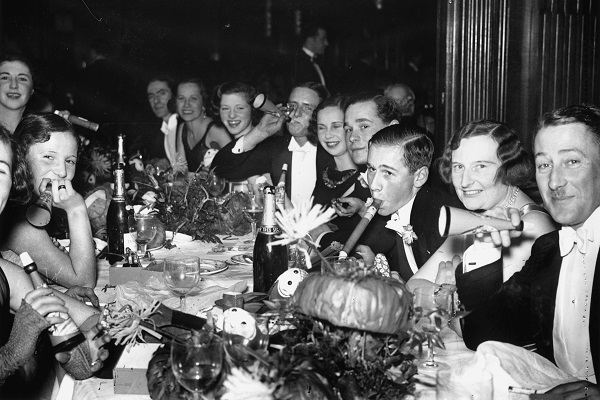‘I had decided that I wished to write a novel about the immediate present – this was the summer of 1930 – and I had been speculating about the way people were acting and feeling,’ wrote Helen Hull of Heat Lightning in 1932.
Heat Lightning follows the tumultuous Amy Norton as she returns temporarily to her family home, only to be subjected to all sorts of minor family dramas — illegitimate children, sudden deaths, hidden debts and destroyed wills (the usual problems). This book, beautifully reprinted by Persephone, is solid domestic fiction, but it replaces the acute social observation and deep psychological profundity available to the best of its genre with the ‘speculation’ of our confused protagonist.
Much of Amy’s turmoil is a result of having been parted, temporarily, from her husband. They have argued, although over what we never find out. It occasionally seems like we’re expected to know already (‘what she had run from had been far clearer than her goal’), or at least not to think it relevant. It’s important, however, because if someone is going to spend 400 plus pages whining then they need their audience to be at least vaguely sympathetic.
As it stands, the vast quantity of vacuous introspection soon grates, and frequently crashes into bathos. Sometimes Hull tries to lift things with elaborate description: ‘It was strange, when a voice so held the essential quality of a person, that you couldn’t recall it, like a detail of face or movement. You could think around it, but you couldn’t hear it. At the sound, the words indistinguishable, low, full, a hint of overtone…’ and so on and on and on.
Other moments of faux-profundity come when the mostly-absent Geoffrey (Amy’s husband) is wheeled out (into Amy’s head) to ‘say wonderful things’ — ‘The trouble with those men is that they’ve had a dose of concentrated essence of life. Most of us get small doses, administered at intervals, until we develop some immunity to the horror, the futility, the cruelty at the bottom of this sweet world.’ It’s unclear what or who he’s talking about; but he sounds wise, and that’s what this novel is about.
As is fitting for someone unable to resist the melodrama of ‘this sweet world’, Hull has a tendency to crush any nuance in her scenes. Characters can’t even ‘glance’ at each other without what is really going on being comically spelled out (‘Catherine’s swift glance warmed Amy, hinted “Thanks for helping smooth him down.”’) She does this less as the book goes on, but then perhaps the first few pages are made to seem worse by all the clumsy character introductions (‘Amy, pulling off her silk coat as she walked along to the door of her old room, thought irritably about Lora, her father’s sister, Tom’s mother.’)
The most intriguing parts of the novel are the interactions between Amy and the book’s one lesbian character, Harriet. Given that Hull spent her life with a woman, Amy’s distaste (which I get the impression the reader is meant to share) seems downright weird. Perhaps we’re witnessing a fictional rendition of self-loathing; Amy’s attitude is often so unfairly insulting as to be very funny. When Harriet complains at not being given her allowance on account of being a woman and a lesbian, ‘Amy looked down at the bench, at the shadowy lump that was Harriet.’ When Harriet enters a room, we have: ‘Just like a pigeon, thought Amy, near-sighted and concentrated on her own projects; her head moves on her neck like a pigeon’. Elsewhere, ‘[Harriet] looked beset, if grotesquely so’, and ‘her glance at Amy tried, ineffectually, to push a cover over all the squirmings of her uncomprehended self.’ A shadowy squirming lump with a head like a pigeon? No other character is described with such unrelenting disgust, and there’s no plot-driven reason for Harriet to be, either. She’s so often accused of being selfish, or egocentric, that I wonder if there’s more we’re not being told.
If a novel fails to persuade its reader that the questions at its heart are worth asking, then the novel is doomed. This is undoubtedly an ambitious and probing book, and Amy Norton is obviously, as Hull herself writes, ‘searching for an understanding of herself’ — but so what? Why is it so important, and why should we care? And even then, ‘understanding’ oneself seems to mean behaving according to a set pattern. To be ‘understandable’, it’s suggested, is to be ‘predictable’ — it’s to have a ‘code, without conflict or rebellion’. Amy craves a certain kind of clarity: ‘It had been easier, she thought, to live when you knew exactly what you believed, what was right, what you and everyone else should do.’ It might be ‘easier’, but to suppose that life has ever been like that seems idiotic. It betrays the deep aversion to uncertainty that Hull is concerned with. It’s a far from outdated theme and so it’s a shame, perhaps, that this novel doesn’t quite manage to explore it with a more attractive version of the muddled mind.
Heat Lightning by Helen Hull is published by Persephone Books (£12.99)






Comments